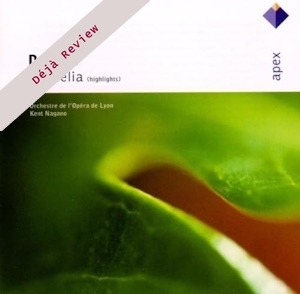
Déjà Review: this review was first published in September 2003 and the recording is still available.
Léo Delibes (1836-1891)
Coppélia, ballet in 3 acts (1867) (extracts)
Orchestra of the Lyon Opera/Kent Nagano
rec. 1993, Lyon Opera House, France
Apex 2564 603652 [75]
The general opinion among critics seems to be that this Nagano recording of Delibes masterpiece is the finest available. Listening to this very well filled highlights disc, it’s almost impossible to quibble with that view. The main competition, at least in modern digital recordings, appears to be from Richard Bonynge and the National Philharmonic on Decca, and Mark Ermler and his Covent Garden forces on their own label. But Nagano has such an infectious way with this score that makes it very hard to resist, and at super-budget this will be hard to beat.
In fact an extracts disc of this piece makes good sense, and this was a good seller for Erato even at full price. All the best tunes are there, and at nearly 75 minutes, you are only missing around 20-odd minutes of music. So if the ‘bits’ are well chosen, as here, you don’t feel you are missing out on much. Nagano really had whipped the Lyon orchestra into superb shape by the mid-nineties, and the suppleness, characterisation and sheer elan of the playing are mightily impressive. Phrases, accents and the subtlest of nuances all sound newly minted, and he is careful not to lose sight of the whole picture so that narrative flow is maintained. The score itself is, of course, one of the finest in this genre to come out of the 19th Century, and that other great ballet composer, Tchaikovsky, admired this work. As with so much music from this period, the shadow of Wagner looms large in places, and the opening Prelude’s horn call sounds straight out of the Valhalla motive in Das Rheingold. But such is Nagano’s illumination and alertness to the score’s colours that one is transported effortlessly into this magic world without thinking of other references. There are substantial items from all three acts, and high points aplenty. I would particularly mention the Act 2 Bolero, with its superb dash and brio, and the opening March of Act 3, which has compelling forward momentum. Also, the marvellous sequence of dances that follow are beautifully turned, with a gorgeous viola solo in La Paix (track 23) and a thrilling final Galop.
Recording quality is outstanding, with plenty of detail and a spectacular range. Notes are good, with a decent background plus fairly full synopsis of each act. If you don’t know the piece, this is definitely the place to start. If you own another version, supplement it with this.
Tony Haywood
Help us financially by purchasing from



















